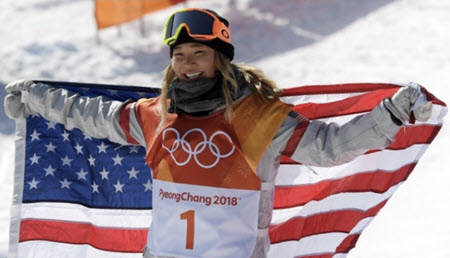Since their inception, the Olympic Games have served as a platform for congenial international cooperation based on a mutual appreciation for sports, athletes, and their well-honed skills. The games foster national pride in both the competitors and the audience and allow nations the opportunity to set aside their differences and enjoy a spectacle of blended cultures. This year’s Winter Games in Pyeongchang, South Korea are no different, and have seen incredible feats of athleticism from all participating nations, but the stories of several of Team USA’s star athletes are catching special attention, in light of the United States’ current divisive debate on what, and who truly makes America great.
 Several of the American competitors who have shone the brightest this year are, in fact, new Americans; second-generation immigrants whose parents risked it all, often coming to the United States with next to nothing but a dream of something better, or who made that harrowing journey themselves.
Several of the American competitors who have shone the brightest this year are, in fact, new Americans; second-generation immigrants whose parents risked it all, often coming to the United States with next to nothing but a dream of something better, or who made that harrowing journey themselves.
Chloe Kim Achieves the “American Dream”
One of these athletes, Chloe Kim, a prodigy snowboarder who, at only 17 years old, just won a gold medal for Team USA in the women’s snowboard halfpipe, is the daughter of a South Korean. In 1982, her father arrived in the United States with just $800 cash, never dreaming that his daughter would one day achieve such an honor. He worked a series of minimum wage jobs, finally scraping together the money to study engineering in Southern California. From the time Chloe was born, he fostered her talents, even sacrificing his engineering career to allow her to pursue her dreams as he once pursued his. In response to Chloe’s stunning win, he exclaimed, “The dream came true. The American dream!” Chloe tearfully acknowledged her dad’s sacrifice after her big win, saying that she couldn’t imagine, “leaving your life behind and chasing this dream with your kid.” Chloe and her father are glowing examples of what the United States represents to many people around the world: a place where true greatness can be achieved by those willing to do what it takes to pursue it.
Mirai Nagasu Makes History
Sometimes, the children of immigrants grow up to be history makers. Such is the case for Mirai Nagasu, the first American female figure skater to land the challenging triple axel at the Olympics. Mirai’s parents are Japanese immigrants who own a Japanese restaurant in Arcadia, California, but who are not U.S. citizens. While their daughter competed for her bronze medal, they were hard at work in their restaurant, but they plan to close for the first time in years to celebrate Mirai’s incredible achievement. Mirai’s parents are dedicated business owners, and her father’s artistry as a sushi chef inspired her to pursue an art all her own. She spent much of her time as a child in her parents’ restaurant, often sleeping in the closet and snacking on sushi when they could not afford a babysitter and dreamed of becoming an athlete like fellow Olympian figure skater Michelle Kwan, who is also the daughter of restaurant-owning immigrants.
Despite her heritage, Mirai considers herself to be fully American and is proud to represent her country in an event as prestigious as the Olympics. When Mirai was 22, she was required by Japanese law to relinquish her dual Japanese-American citizenship, and she gladly chose to remain in her home country, the United States. In response to her groundbreaking achievement, she joked, “Maybe it’s the Japanese genetics – but lucky for me I’m American, so I’ll be the first U.S. lady.” She told the Washington Post, “It’s historical and something no one can take away from me. I wanted to make America proud.”
Maame Biney: An Inspiration
 Maame Biney, a speed skater and high school student who is only 18 years old, has quickly become one of the most famous faces at the 2018 Winter Olympics. She is outspoken, cheerful, and has been described as “Explosive,” and as having “the speed and power of a sprinter.” She describes herself as, “fierce and strong.” Maame was born in Ghana and moved to the United States at age 5 after visiting her father, who had immigrated to Washington D.C. Her mother, brother, and the rest of her family remain in Ghana. Maame recognizes what her father had to sacrifice for her to have a chance to reach Olympic fame, and said, “He has given up a lot for me to have this dream. It’s been an amazing journey, through hardships and through the good things that happened. I’m very lucky to have a dad like my dad.”
Maame Biney, a speed skater and high school student who is only 18 years old, has quickly become one of the most famous faces at the 2018 Winter Olympics. She is outspoken, cheerful, and has been described as “Explosive,” and as having “the speed and power of a sprinter.” She describes herself as, “fierce and strong.” Maame was born in Ghana and moved to the United States at age 5 after visiting her father, who had immigrated to Washington D.C. Her mother, brother, and the rest of her family remain in Ghana. Maame recognizes what her father had to sacrifice for her to have a chance to reach Olympic fame, and said, “He has given up a lot for me to have this dream. It’s been an amazing journey, through hardships and through the good things that happened. I’m very lucky to have a dad like my dad.”
Maame is also a history maker. She is the first African American woman to ever represent Team USA in short track at the Olympic Games, and she understands what this means to those who watch her compete. She said, “It feels very inspiring because that means I get to inspire other kids in Virginia, in the United States, maybe all over the world, to just go out and do what you love because you never know, you might accomplish your goal.” If her father had never decided to take the daring step of moving to the United States, she would never have had the opportunity to inspire, encourage, and change the face of Olympic speed skating forever.
All three of these young women have one thing in common: if current talks to restrict immigration and limit the number of visas even further continues, future generations will not have the opportunity to achieve their dreams in the United States. These athletes became Olympic champions with the support and sacrifice of their hardworking families, who dared to dream of something more. To steal opportunity from young people like Chloe, Mirai, and Maame is to do a disservice to the United States. In a country that is built on diversity, and whose Olympic team boasts talent from all backgrounds, the future depends on continuing to reach out into the world for fresh talent, rather than closing the door in their faces.

